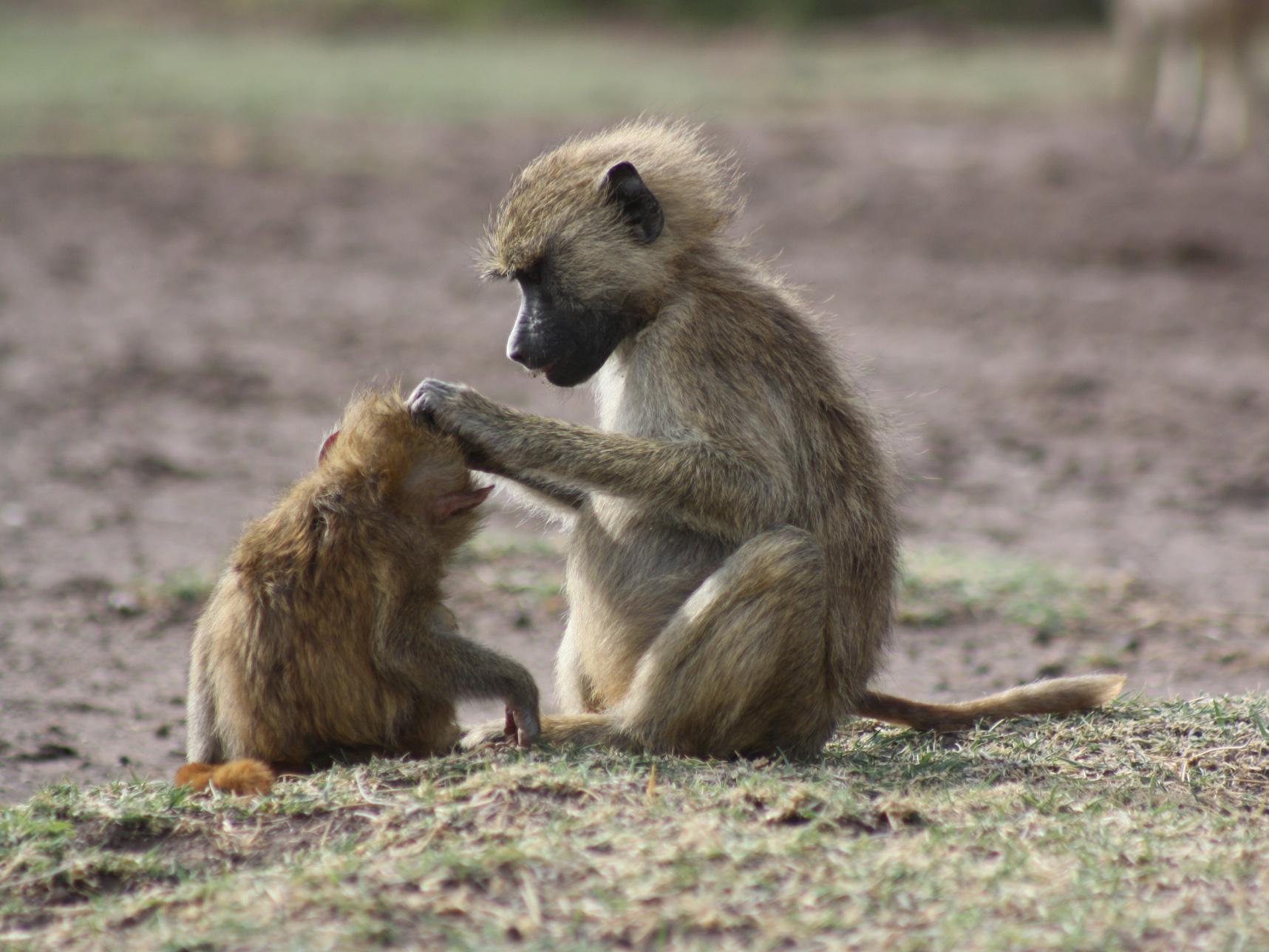Social relationships and social skills begin early in life and are linked to survival in adulthood for baboons, according to research released by a team led by SUNY Oswego biological sciences faculty member Liz Lange. (Photo by Elizabeth Lange)
Forming friendships can help mitigate the effects of trauma early in life, according to new research released by a team led by SUNY Oswego biological sciences faculty member Liz Lange. While the study involved baboons, researchers see tangible connections to humans.
Titled “Early life adversity and adult social relationships have independent effects on survival in a wild primate,” the paper recently was published in Science Advances and has already earned attention from mainstream media outlets.
“The evidence suggests that strong social ties may be one way to make up for adversity in early life,” according to an article for which Lange served as the lead writer in The Conversation. “People (and other animals such as killer whales, hyraxes and baboons) with strong adult friendships are healthier and live longer than those without such bonds.”
Lange took part in the study during her postdoctoral research at Duke University. While Lange’s dissertation studied the early life effects of social environments on small fishes, this study, with decades of data on baboons, asked similar types of questions.
Co-authors include Susan C. Alberts, Fan Li, and Shuxi Zeng of Duke University; Fernando A. Campos of the University of Texas at San Antonio; Jenny Tung of the Max Planck Institute for Evolutionary Anthropology; and Elizabeth A. Archie of the University of Notre Dame. The team worked with data from 1983 to 2019 collected by the Amboseli Baboon Research Project by observing nearly 200 baboons in southern Kenya.
“One major finding of this research is that early life environments and adult social bonds or friendships have independent effects on survival instead of all of the impacts of early life environments going through a pathway that includes social bonds,” Lange said.
“We’ve seen these relationships before the study in humans and in nonhuman animals like baboons,” Lange added. “There are links between early life adversity and reduced survival as well as links between social isolation and dying younger. In other words, if you have a bad childhood or you don't have friends, you tend to have a shorter life. However, this is the first study to show that these links are largely independent.”
Some previous hypotheses proposed that early life adversity might drive poor levels of friendships in adulthood which in turn result in poor survival. But the study instead found early adversity and social isolation are independent factors.
“And that's actually really exciting,” Lange said, “because this means that we can target interventions during both early life and adulthood to promote increased lifespan.”
Value of friendship
Good friendships, by the statistics, really can save –- or at least prolong -- lives.
“We found that for certain sources of early adversity, if you can make strong friendships, they can make up for your bad early start,” Lange said. “For example, if you lose your mom but you still make strong friendships, then your survival is not as bad. That means making friends is really important if you have a bad early life.”
Lange’s role involved mostly computer coding, data organization and analysis, although she was able to go into the field for some observation. Lange started the project in early 2020, just before the COVID pandemic hit.
“It was a great opportunity to use this long-term data set,” Lange said. “None of this work would be possible without the amazing field team who's out there six days a week and can individually identify hundreds of baboons by sight. They really drive all this work.”
Using animal models to study questions in humans is a common practice among scientists, Lange said, and this kind of direct observation isn’t nearly as easy to do with human subjects.
“We see parallel findings in terms of the effects of early life and adversities on human populations and the baboon population, so this suggests that baboons are a good model,” Lange said. “Baboons also have a similar life cycle to humans, but it's accelerated, so we can study multiple generations in a fraction of the time compared to humans.”
Because of the size of the dataset and progress toward some questions so far, research on similar topics will continue. And while the majority of the study will continue at Duke, Lange noted that related opportunities through the project exist for Oswego students.
“The door is always open for interested students to contact me to work on this type of question,” Lange said. “Most of the research involves working with the dataset by sitting at a computer and coding, which is less exciting than doing fieldwork in Kenya, but it is still really fun. Students do well with being involved because these types of skills are important for diverse careers inside and outside of biology.”




